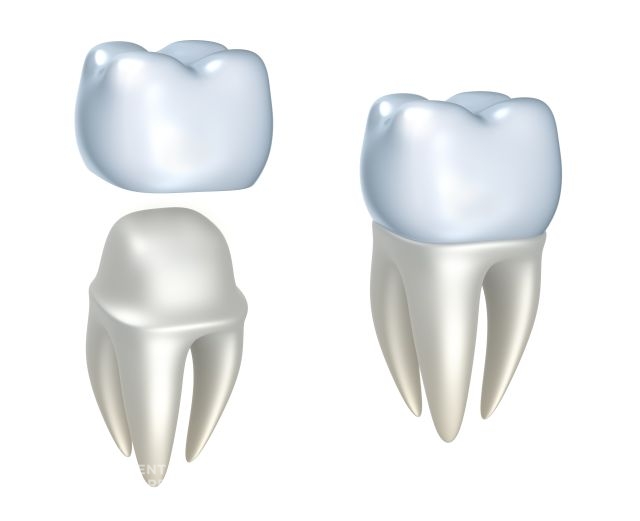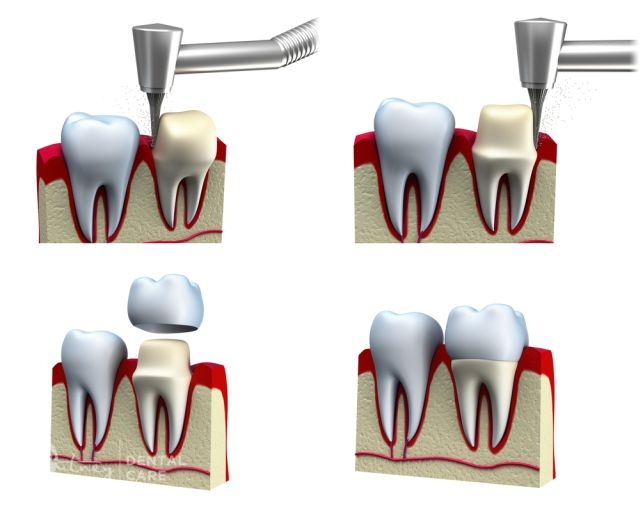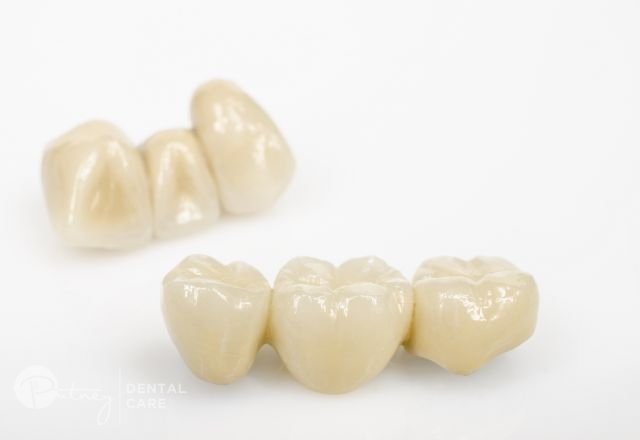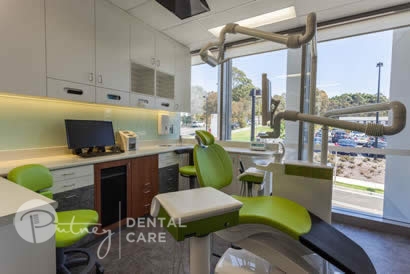
Crowns and Bridges
Our teeth are as susceptible to ageing as the rest of our bodies and often succumb to decay, trauma, and general wear and tear. Some of these issues are unavoidable effects of ageing. At the same time, other factors can contribute to the deterioration of teeth, such as what we ingest, how and what we chew, oral hygiene, and general maintenance or proper care for teeth.
People with weakened, damaged, or missing teeth are more than ever turning to dental crowns and bridge procedures to rejuvenate their teeth’s health, look, and function.
What is a Dental Crown?
A dental crown, or “cap”, is a dental restoration material that is cemented over a cracked, broken, discoloured, or weak tooth. Crowns help prevent further deterioration from teeth that have cavities, stains or structural damage.
Dental crowns can cost between $1,000 and $3,000, depending on the crown’s material and location.

Types of Crowns:
During a consultation with Putney Dental Care, our general dentist will advise you of the different crown materials available and instruct which is most suitable for your condition.
Gold Crowns – $600-$2,500
Gold is a popular metal for your back teeth due to its durability and strength. This crown type is particularly helpful for protecting your teeth when eating, grinding or biting.
Porcelain Crowns – $800-$3,000
Porcelain crowns are the most popular material in dentistry due to their near appearance to a regular tooth. These crowns are suitable for someone who would like an aesthetic replica of their normal tooth.
Porcelain Fused to Metal – $500-$1,500
Porcelain crowns fused to metal are created using a porcelain exterior attached to metal alloys on the interior. The combination is preferred for its combination of strength and style.
Zirconia Crowns – $800-$3,000
Zirconia crowns are also a kind of ceramic material that is strong, biocompatible and quick to install. They tend to last for just as long as metal-based fit crowns.
Who Should Get Dental Crowns?
You should consider investing in dental crowns if you’re experiencing any dental issues of specific concern. Such issues include:
- Weakened, decayed, cracked, or broken tooth/teeth
- Old or failing dental fillings
- Worn down tooth/teeth from grinding
- Cosmetic reasons, i.e. stained, misshapen front teeth
- Dental implant
- A surgical or invasive procedure such as root canal treatment
- A means of holding dental bridges in place
Procedure
A standard crown procedure begins with examining your oral health. A dentist will first assess the existing damage or decay to the tooth of concern and determine if you’re suitable for the procedure.
After this, your dentist will remove damaged layers of your tooth before taking an impression with non-toxic alginate mould. The impression helps ensure a snug fit for your custom crown, effectively minimising any risk of complications or future damage.
Our general dentist will then install a temporary crown to help protect your tooth from any further damage while you wait for your permanent cap to be made. You can expect to wait up to a week for your permanent crown to be ready, at which point we will organise an appointment for installation.

What Does a Crown Look Like On a Tooth?
A dental crown should look almost identical to a normal tooth. However, if you choose a gold or silver crown, it will appear slightly different in colour and texture.
At Putney Dental Care, our quality service makes it very difficult for other people to tell that you have dental crowns installed.
What is a Dental Bridge?
A dental bridge is a fixed dental prosthesis that offers a solution to anyone with a missing tooth or missing teeth. The teeth surrounding the missing tooth serve as an anchor to hold the bridge in place, provi
A dental bridge is a fixed prosthesis that fills any gaps caused by a missing tooth or teeth. The teeth surrounding the gap serve as an anchor to hold the bridge in place, effectively providing the appearance of a complete dental set.
A standard dental bridge can cost between $3,000 to $5,000. However, the cost may vary depending on the location, material, and the number of missing teeth.

Types of Bridges
Types of bridges vary depending on the cost, structural damage, and personal preference of the person, but generally include the following options:
- Traditional bridges or fixed bridges
- Cantilever bridges
- Resin-bonded bridges
- Maryland bridges
- Implant-supported
Who Should Get Dental Bridges?
You will need a dental bridge if you have a missing tooth or a row of missing teeth. Dental issues can affect anyone, from young people with accidents or degenerative diseases to older people whose teeth are simply wearing down.
Whether or not a dental bridge is right for you will depend entirely on your oral health diagnosis, jawbone density, and personal preference. If you are not sure, book a consultation with a dentist.
Procedure
A dental bridge procedure will always involve an examination of your dental health to assess structural integrity, decay, and disease. This inspection may even include X-rays and other forms of measurement for accuracy.
If our dentists find any issues of concern with your oral health, we need to treat them accordingly before fitting a bridge. This is because the bridge would trap any existing tooth damage and can cause further dental complications such as gum disease.
Once your dental issues are addressed, a dentist will file down your teeth and take an impression of the gap. This mould is then used to create your dental bridge, which takes approximately 2 to 4 weeks. In the meantime, we will fit a temporary bridge to fill the gap caused by the missing tooth while you wait for the permanent fixture to arrive.
What Does a Bridge Look Like?
A bridge should look like a set of normal teeth. The point of a bridge is to replace a missing tooth or teeth with partial dentures to recreate the appearance of healthy teeth.
Expert Dental Crown and Bridge Treatment in Ryde, Gladesville and Meadowbank

Crowns and bridges are not only important for aesthetic benefits but also for protecting your oral health. Our dentists
at Putney Dental Care provide you with proactive care, ensuring that your results are perfect and long-lasting. Easily accessible for anyone in Ryde, Meadowbank and Gladesville, our general dentistry team will ensure your dental needs are met!
To discuss your wants and needs with your dental crown or bridge, book an online appointment with us or call (02) 9808 2588.
FAQs
How Long Do Crowns and Bridges Last?
Just like natural teeth, crowns and bridges do not last forever. The lifespan of a crown or bridge is approximately ten years. However, this can vary dramatically depending on how they are used, maintained, and cared for.
Which is Better: a Crown or Bridge?
Crowns and bridges have different functions. Crowns act as caps or protective covers for an existing tooth, whereas dental bridges are designed to replace the gap caused by missing teeth. The two are often used in conjunction as damaged or missing teeth can be bridged with a false tooth by attaching two connected crowns to adjacent teeth.
Can You Get a Bridge if You Have a Crown?
Yes, bridges are generally attached to two teeth that are surgically worn down and capped to hold a bridge in place. They are used in tandem for the best effect.
Which is Cheaper Root Canal or Bridge?
The average cost of a root canal treatment can range from $800 to $3500, depending on factors such as location. A dental bridge can cost anywhere from $1500 to $5000 plus, depending on the number of adjacent teeth, location, and complexity of the surgery.
You should consult your dentist about all options before deciding on a course of action.
Can Teeth Decay Under a Bridge?
Unfortunately, crowns and bridges are still susceptible to further tooth decay if food becomes lodged between the bridges and the teeth, which is a difficult area to clean with a traditional toothbrush. This is generally more common if the bridges are poorly fitting and the individual is less prudent and consistent regarding their dental hygiene. If the bridges fit well, cleaning is thorough and regular, and the person practices good oral hygiene, tooth decay under bridges is much less likely.
